Have you ever wondered how do realistic tattoos age over time? Tattoos have become increasingly popular over the past few years, and more people are opting for realistic designs. But as time passes, tattoos tend to lose their vibrancy and sharpness, so it’s important to understand how realistic tattoos age and what steps you can take to ensure that your ink lasts for as long as possible. In this article, we’ll cover everything you need to know about how do realistic tattoos age over time.
Contents
Overview of Realistic Tattoos
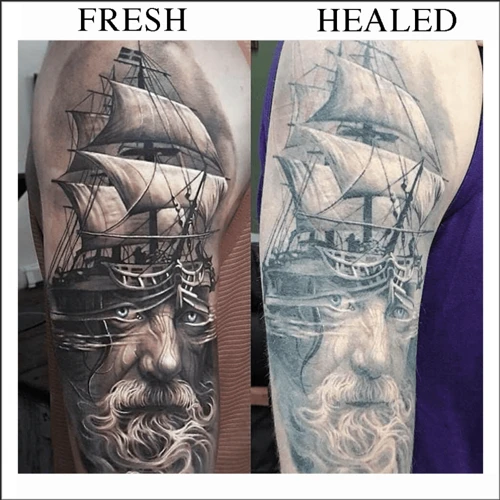
Realism tattoos are tattoos that are designed to look as realistic as possible. They can be portraits, landscapes, or any other design that strives to look as realistic as possible. Realism tattoos use highly detailed shading to create a lifelike image, often with hairline strokes and vibrant colors.
Definition of Realism Tattoos
Realism tattoos are tattoos that strive for a high level of realism. They often involve highly detailed shading, a wide range of colors, and sometimes even hairline strokes. The goal of realism tattoos is to create an image that looks as lifelike as possible.
Popularity of Realism Tattoos
Realism tattoos have seen a surge in popularity in recent years. They are now one of the most popular types of tattoos, with more people opting for realism tattoos than ever before. The time it takes to complete a realism tattoo can vary depending on the size and complexity of the design, but they generally take longer than other types of tattoos. How long does a realism tattoo take? On average, a realism tattoo can take anywhere from 8 to 12 hours, though larger and more complex designs can take even longer.
How Do Realism Tattoos Age Over Time?

Factors Impacting the Ageing Process
A realistic tattoo’s aging process is largely determined by the quality of the artwork, the placement of the tattoo, and the care it is given during the healing process. The artist’s skills, the type of ink and needles used, and the location of the tattoo on the body can all affect how quickly a tattoo fades or changes over time. Additionally, lifestyle factors such as exposure to the sun, smoking, and certain medications can also affect how quickly a tattoo will age.
How Long Does a Realism Tattoo Take?
Realistic tattoos typically take longer to complete than other types of tattoos due to the level of detail and complexity. The artist will need to take their time to ensure the tattoo looks as realistic as possible. Generally speaking, a realism tattoo can take anywhere from two to four hours to complete, depending on the size and complexity.
It is important to remember that a realism tattoo will require more upkeep and care than other types of tattoos in order to keep its original look and vibrancy. Proper aftercare and regular touch-ups are key to maintaining the tattoo’s original look for as long as possible.
Ways to Prolong the Life of a Realism Tattoo
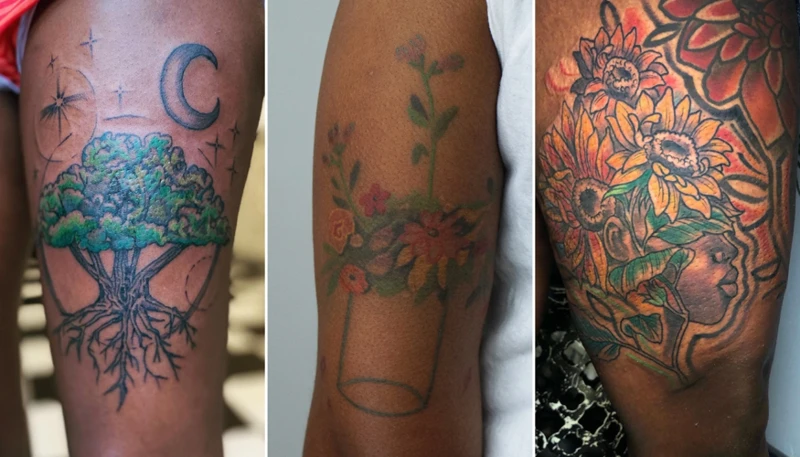
Proper Aftercare
It is essential to follow the aftercare instructions given by your tattoo artist. This includes cleaning the area with warm water and a mild soap and keeping the area moisturized. Cleanliness is key to keeping your tattoo looking fresh for years to come.
Sun Protection
UV rays can cause your tattoo to fade or even distort the colors. Using sunscreen when in direct sunlight and covering up with clothing can help protect your tattoo from the sun’s harmful rays.
Visiting a Professional
If you notice that your tattoo is starting to look dull or you have areas that are not as vibrant as they once were, visiting a professional artist can help restore the colors and vibrancy of your tattoo. An experienced artist can also provide you with tips and advice on how to care for your tattoo.
Conclusion

Realistic tattoos age in a predictable manner over time, with the color fading and becoming less sharp. However, proper aftercare, including sunscreen, will help to protect your tattoo and keep it looking vibrant for longer. In general, realistic tattoos tend to last longer than other tattoo styles, so you can enjoy your artwork for years.
In summary:
| Tattoo Style | Aging Effects | Longevity |
|---|---|---|
| Realistic | Color fading, less sharp | Longer |
| Other Styles | Color fading, less sharp | Shorter |
Regardless of the style, proper aftercare is essential for maintaining the look of your tattoo and keeping it vibrant for years.
References
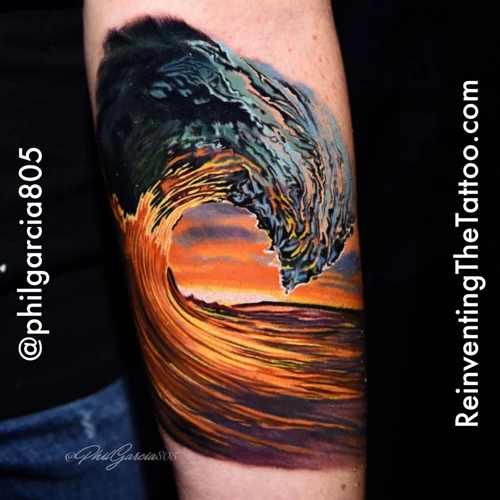
- Tattoo Care: How to Take Care of a Tattoo. WebMD – https://www.webmd.com/skin-problems-and-treatments/tattoo-care#1
- Tattoo Ageing: How Realistic Tattoos Age Over Time. TattooEasily.com – https://www.tattooeasily.com/how-realistic-tattoos-age-over-time/
- Fading: How to Prevent Tattoo Fading. Tattoo Health – https://www.tattoohealth.org/how-to-prevent-tattoo-fading/
- Sun: UV Rays and Tattoos: How to Protect Your Ink. Tattoodo – https://www.tattoodo.com/a/2019/02/uv-rays-tattoos-protect-ink/
Aging of Realistic Tattoos
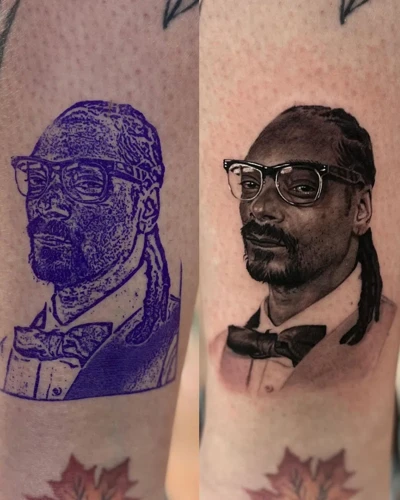
Realistic tattoos age in a variety of ways as time goes on, and these changes can be both positive and negative.
Color Fading: Over time, the colors of a realistic tattoo will start to fade or become duller, which can be a natural part of the aging process. This is especially true of bright colors, as they tend to be the first to fade.
Blurring: The sharp lines and details of a realistic tattoo will also start to blur with age. This is due to the natural breakdown of the ink, as well as the natural wear and tear of the skin. As the tattoo is exposed to the elements, it will start to blur and lose its detail.
Loss of Contrast: As the colors of the tattoo start to fade, the contrast between the colors will also start to lessen. This means that the colors will start to blend together, making it harder to distinguish the separate shades.
Textural Changes: The texture of a realistic tattoo can also start to change over time. As the tattoo ages, the skin may start to become thicker or thinner, which can make the tattoo look different than it originally did.
Infection: It’s also important to note that the aging of a realistic tattoo can be impacted by infection or other skin conditions. If a tattoo is not properly cared for, it may be more likely to become infected and the colors may fade faster than normal.
Overall, realistic tattoos will age differently for every person, but understanding the potential changes can help you make sure that you are taking proper care of your tattoo. With the proper care and attention, you can ensure your tattoo looks its best for years to come.
How Tattoos Age Over Time
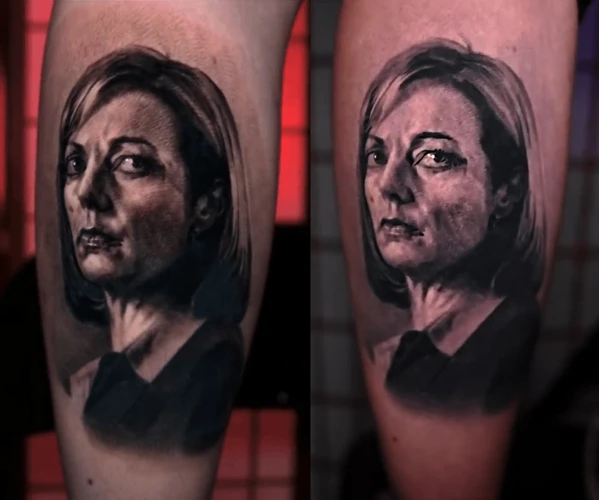
Tattoos are permanent pieces of art that can last a lifetime if taken care of properly. But how do realistic tattoos age over time? The answer to that depends on a few factors, such as the artist’s skill, the quality of the ink used, and the care given to the tattoo.
Artist Skill: A skilled artist can make a difference in how realistic a tattoo appears, even after many years. A skilled artist can create a tattoo that will still look beautiful over time, while an inexperienced artist’s work may not age as gracefully.
Ink Quality: The quality of the ink used can also affect how a tattoo looks over time. Quality inks are designed to last and will maintain their vibrancy for years to come. Cheaper inks may fade or change colors more quickly.
Care: The way you care for your tattoo can also have an effect on how it ages. Taking precautions such as keeping it out of the sun and applying a quality moisturizer several times a day can help keep it looking vibrant for years.
Realistic tattoos can age well over time, but the results depend on the skill of the artist, the quality of the ink, and the care you give your tattoo. Taking care of your tattoo and choosing a skilled artist can ensure that your realistic tattoo will look beautiful for years to come.
How Do Realistic Tattoos Age Over Time? Here’s What You Need to Know
Realistic tattoos are beautiful works of art that can enhance your appearance and bring your body to life. But like all tattoos, they can fade and change over time. Knowing how realistic tattoos age can help you make an informed decision when choosing your design and prepare for any changes that may occur.
What Factors Affect How Realistic Tattoos Age?
- The Quality of the Tattoo: Poor quality tattoos can fade quickly and distort over time due to low-grade ink and sloppy technique.
- The Location of the Tattoo: Tattoos placed on areas of the body that are exposed to the elements are likely to age more quickly than tattoos in more protected areas.
- Your Skin Type: People with oily skin tend to have tattoos that fade faster than those with dry skin.
- Your Age: Older people may find that their tattoos age faster than younger people.
- Your Health: People with certain skin conditions can experience more rapid fading of their tattoos.
How Long Does a Realism Tattoo Take?
The amount of time it takes to complete a realistic tattoo depends on the size and intricacy of the design. On average, a realism tattoo can take anywhere from 5-15 hours to complete, although some may take longer.
How Long Do Realism Tattoos Last?
The lifespan of a realism tattoo can vary depending on the factors listed above. On average, a realism tattoo can last anywhere from 5-15 years before it starts to fade and distort. However, this time frame can be affected by a variety of factors, so it is important to keep the above factors in mind when getting a realism tattoo.
Frequently Asked Questions
What Kind of Ink Should I Use for a Realistic Tattoo?
Using the right ink is essential for creating realistic tattoos that will age well over time. Professional tattoo artists typically use high-quality, professional-grade inks that are specifically designed for tattoos. These inks are made to be safe and long-lasting. Look for inks that are vegan-friendly, made with organic ingredients, and non-toxic. Some inks even contain hyaluronic acid, which helps keep the skin hydrated and protected.
Is there anything I can do to help slow down the aging of a tattoo?
- Use Sunscreen: Protecting your tattoo from the sun is the best way to keep it looking fresh and vibrant. Always apply sunscreen before exposing your tattoo to the sun, and reapply every two hours. Sunscreen with an SPF of 30 or higher is recommended.
- Avoid Soap: Soap can be harsh on your tattoo, so it’s best to avoid using it on your tattooed areas. Instead, opt for a mild cleanser and lukewarm water for cleaning your tattoo.
- Moisturize Regularly: Keeping your tattoo moisturized is key to slowing down the aging process. Use a rich moisturizer, like cocoa butter, to help keep your skin hydrated and supple.
- Keep It Out of the Pool: Chlorinated water can be harsh on your tattoo and cause it to fade faster. Try to avoid swimming with a new tattoo, and when you do go in the pool, make sure to apply a waterproof sunscreen.
- Visit Your Tattoo Artist: Your tattoo artist is the best person to consult when it comes to caring for your tattoo. They can recommend specific products or techniques to help keep your tattoo looking fresh and new for longer.
Are Certain Colors More Prone to Fading Than Others?
Darker colors like black and blue are less prone to fading than lighter colors like pink and yellow. Tattoos with multiple colors and intricate details are more susceptible to fading than simpler designs. If a tattoo is exposed to the sun for long periods of time, it can fade more quickly than if it were in a shaded area. Additionally, tattoos with a lot of white ink can be more prone to fading than those without. The use of color-stable inks and proper aftercare can help prevent fading.
Do tattoos age differently depending on the body area?
- Skin Type: Depending on the skin type, tattoos may age differently. Those with dry skin may not retain the vibrancy of their tattoos as much as those with oily skin.
- Location: Tattoos located on areas of the body that have more movement or friction may age faster than those in less active areas.
- Exposure: Tattoos that are constantly exposed to sunlight may fade more quickly than those that are protected from the sun.
- Ink Quality: The quality of the ink used can also affect how quickly a tattoo will age. Lower quality ink may fade more quickly than higher quality ink.
- Health: Poor health can also take a toll on how quickly a tattoo ages. Those with weaker immune systems may find that their tattoos age more quickly than those with healthier immune systems.
The answer to this question is yes, tattoos do age differently depending on the body area. Factors such as skin type, location, exposure, ink quality, and health can all play a role in how quickly a tattoo will age over time.
Are there any special aftercare procedures to help preserve a realistic tattoo?
Cleanliness: It is important to keep the tattoo clean to prevent infection, which can cause the tattoo to look less realistic. Clean the tattoo with lukewarm water and a mild soap, and then pat dry with a clean, soft towel.
Moisturizing: Keeping the area moisturized will help it remain vibrant and prevent the colors from fading. Apply a water-based, fragrance-free lotion twice daily.
Sunscreen: Sun exposure can cause the colors to fade, so applying sunscreen with an SPF of 30 or higher will help keep the tattoo looking vibrant.
Avoiding Habits: Habits that may damage the tattoo, such as picking or scratching, should be avoided. Additionally, swimming in chlorinated pools or hot tubs should be avoided as the chemicals can damage the ink.
Conclusion

Realistic tattoos have the potential to age beautifully over time, but the process can be unpredictable. Factors like placement, pigment, and skin type all affect how the tattoo will look in the future. It’s important to discuss these factors with your tattoo artist, who can help you choose the right materials and technique to ensure your tattoo looks its best for years to come.
References
